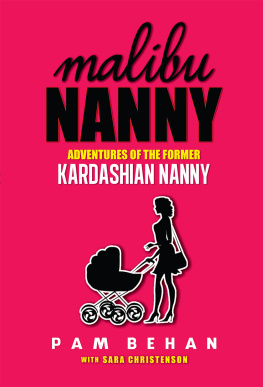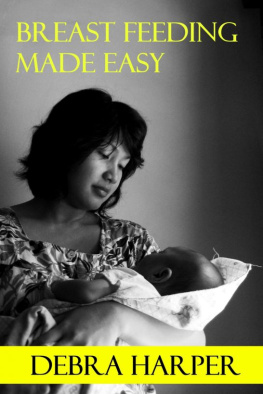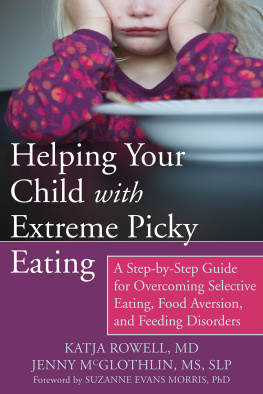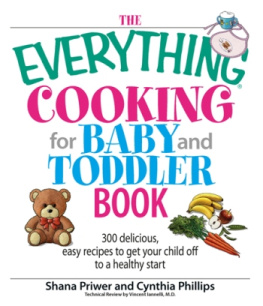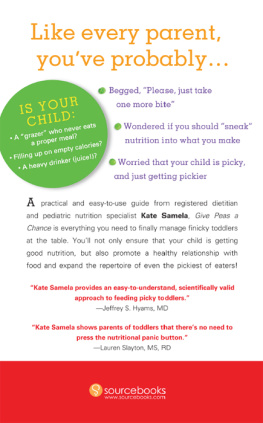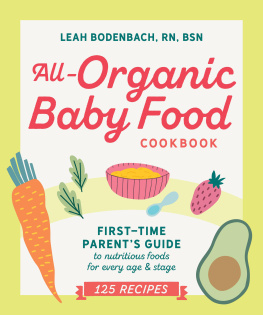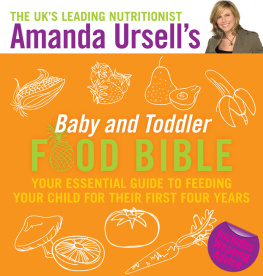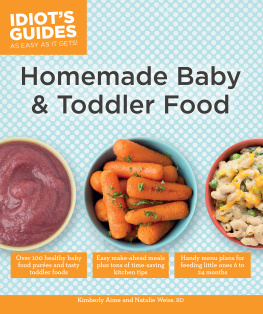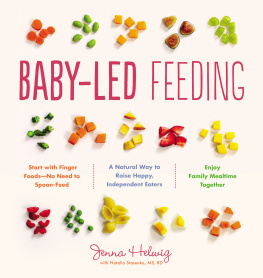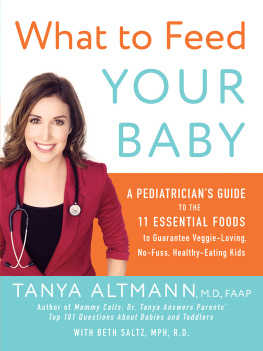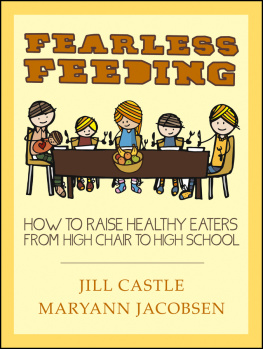
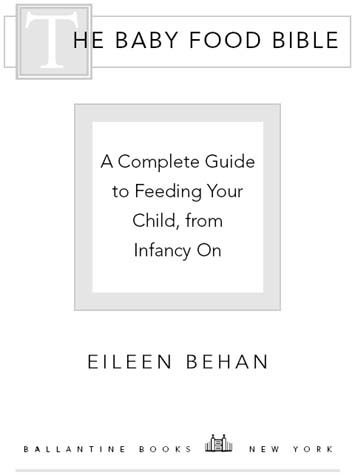
Contents

To my parents,
John and Elizabeth Behan;
thank you for everything
Acknowledgments

Special gratitude goes to my familySheila, Kevin, and Agi; my husband, David; and daughters Sarah and Emilywho are always willing and honest participants in the sharing of ideas, theories, and meals. I would like to thank the extended McCue family for always asking, So, what are you working on now? and being encouraging about what I tell them.
This book would not have been possible without the medical and health specialists who research and publish about pediatric nutrition. Their work is credited in the back of these pages; without their data and statistics all I would have to say would be just commentary and opinion. In particular, I would like to thank Kathleen C. Bloomer ARNP for reading the manuscript cover to cover for accuracy on medical issues. A very special thanks to Jane Hackett MA, RD, CDE, LD for her review of nutrition content and the addition of ideas. To Judith Paige RD, Marilyn DeSimone RD, and Madeleine Walsh RD a very special thanks for all their contributions and support.
This book is in large part inspired by the individuals I have worked with at Core Services, whose questions about food, nutrition, and diet made me see the need for this book, and the staff and providers, who give me the opportunity to make a difference in their patients lives.
Thanks to Trish Cronan and Brad Lavigne, who are always enthusiastic and interested in my work, and to Conni White and Lisa Connors for their goodwill and humor.
A special thanks to Megan Ross, Lisa Kumph, Dawn Sciascia, Christina Couperthwait, Alison Petersen, Kathleen Beede, Elizabeth Winter, Sharon McGovern, and Carla Snowparents who made this a better book by sharing their insights, successes, and concerns about feeding their children.
A huge thanks goes to Kate Cunningham Wilker for reading and commenting on whatever and however much I sent her while raising Graham and Oliver.
To my agent, Carol Mann, for finding a good home for this book. I would like to thank my editor Rebecca Shapiro, and the others at Random House, including Nancy Delia and Robbin Schiff.
Introduction

Y our baby depends on you for everything. You will make sure she is safe and warm, you will do your best to anticipate her needs, and you will try to determine what is wrong when she cries. You will give great thought to every decision you make about your childs well-being, and you will ask questions when you need information. Nutrition is no different. Very quickly your child will move from breast milk or formula to baby food and then on to table food. You will give considerable attention to what she eats and how you prepare it, but unlike previous generations who lived with real concerns about food scarcity and malnutrition, you live in a world of unprecedented food abundance. With that comes unique parenting concerns that no other generation of parents has had to face.
Today a thousand new food items are introduced each month. Young children watch more than eight thousand television commercials each year telling them what to eat. That means that the favorite vegetable of two-year-old children is french fries, and cola sodas are becoming the breakfast beverage of choice. Heart disease accounts for 30 percent of deaths around the world; high blood pressure affects more than 25 percent of adults and is on the rise in children. Rates of obesity among children have tripled in the past three decades. Concurrently, type 2 diabetes has become an epidemic; the prevalence of diagnosis in the United States has increased by 61 percent in the past decade alone. Billions of dollars have been spent on public health projects to educate school-age children in an attempt to reverse the trend in diet-related diseases. None of these programs has been very effective. Unless we take a new approach, it is almost certain that more and more of our children will be impacted, and for the first time your childs generation may not live longer than the previous generation.
Obesity is never an issue in infancy. The environment that creates obesity later on, however, is very much a parenting issue. You can protect your child against the obesity epidemic and its diet-related illnesses by taking an approach to eating and feeding that replaces the current food environment with one that promotes optimal health and strong family relations. Two simple principles will allow you to be successful at this: establish and protect family mealtime, and introduce your child to a variety of truly good food. Your goal is to create an environment that allows your child to develop his natural feeding abilities, and you can do that by serving predictable meals that include a variety of foods, choosing snacks thoughtfully, and eating as a family as often as you can. In this book I will try to answer all nutrition questions with the most accurate and current information available, to help you be a confident parent prepared to guide your child through a complicated food world.
As I write this book my daughters are now eighteen and twenty years old, and I am proud that they have developed good eating habits beyond noodles and apples, which is all they seemed to want as children. When they were young I worried about their desire for sweets, their limited interest in vegetables, and their preference for fruit over vegetables. I watched what they ate, and I had to work hard to avoid interfering with their natural ability to self-regulate. One daughter was a robust eater and the other a dabbler. As a parent, I did the best I could. With the intention of raising healthy kids, I learned about food, I served good food, and I created family meals as a part of that effort. I believe food and family meals are a way to develop rituals that create security. Meals can be an expression of caring and love.
For the past twenty years I have been a practicing nutritionist, talking with thousands of parents about food and family. I know with certainty that the way parents feed their children in the first twenty-four months will lay the foundation for their future health. I also know that right now, as you develop your ideas about parenting and strive to make the best decisions for your baby, is the time to reach you and influence your food and meal choices.
For some of you, cooking and meal preparation can be a source of stressperhaps because you think you are not good at it, you worry about poor food choices, or you fear that if you enjoy food too much it could cause disordered eating in your child when she becomes older. Many of you have struggled with your own food issues; combine this with the news that diet-related disease, obesity, and eating disorders are on the rise and it can make any parent anxious. There are very real and serious issues related to diet. But if you want to create a healthy attitude regarding food, you cant be afraid to use good food as your ally. I believe enjoying food is a way to prevent future food issues.
Next page


